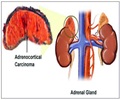Researchers at the Michigan State University (MSU) have suggested that testosterone plays a crucial role in protecting people against eating disorders like anorexia and bulimia.
Researchers at the Michigan State University (MSU) have suggested that testosterone plays a crucial role in protecting people against eating disorders like anorexia and bulimia.
The research team says that their findings may pave way for new treatments of these disorders.The study also gave evidence to support the fact that it’s not only social influences, but also biological factors that are associated with such disorders.
The team of MSU psychology researchers, led by Kristen Culbert, a doctoral student in clinical psychology and Kelly Klump, MSU associate professor of psychology and president of the Academy for Eating Disorders, are conducting this six-year study of 538 sets of twins in Michigan.
The findings of this study indicate that females who were in the womb with male twins were less prone to a risk for eating disorder symptoms than females who were in the womb with female twins. However, in an earlier animal research it was shown that females in the womb with males are exposed to higher levels of testosterone.
“From these findings, it appears that testosterone exposure could have a protective effect against the development of disordered eating,” said Klump.
The academy pointed out that 10 percent or more of late adolescent and adult women report symptoms of eating disorders at any given time.
Advertisement
Klump said that the fast-growing MSU Twin Registry, including more than 1,200 sets of twins ages 6 to 30, provided a substantial research population.
Advertisement
Adding, he said that being raised with a brother did not account for the effects and that’s because researchers also examined females who were not twins but grew up with a brother and discovered that those females were at higher risk for eating disorder symptoms than females who shared a womb with and were raised with a male.
Klump said that the findings could ultimately help improve the treatment of eating disorders.
“More and more animal researchers are discovering how testosterone affects brain development. So if we know there are protective factors against eating disorders, we can potentially determine which areas of the brain might be particularly sensitive to prenatal testosterone exposure and use that information to identify new biological treatments,” she said.
The findings are published in the recent issue of the Archives of General Psychiatry.
Source-ANI
SRM/L










